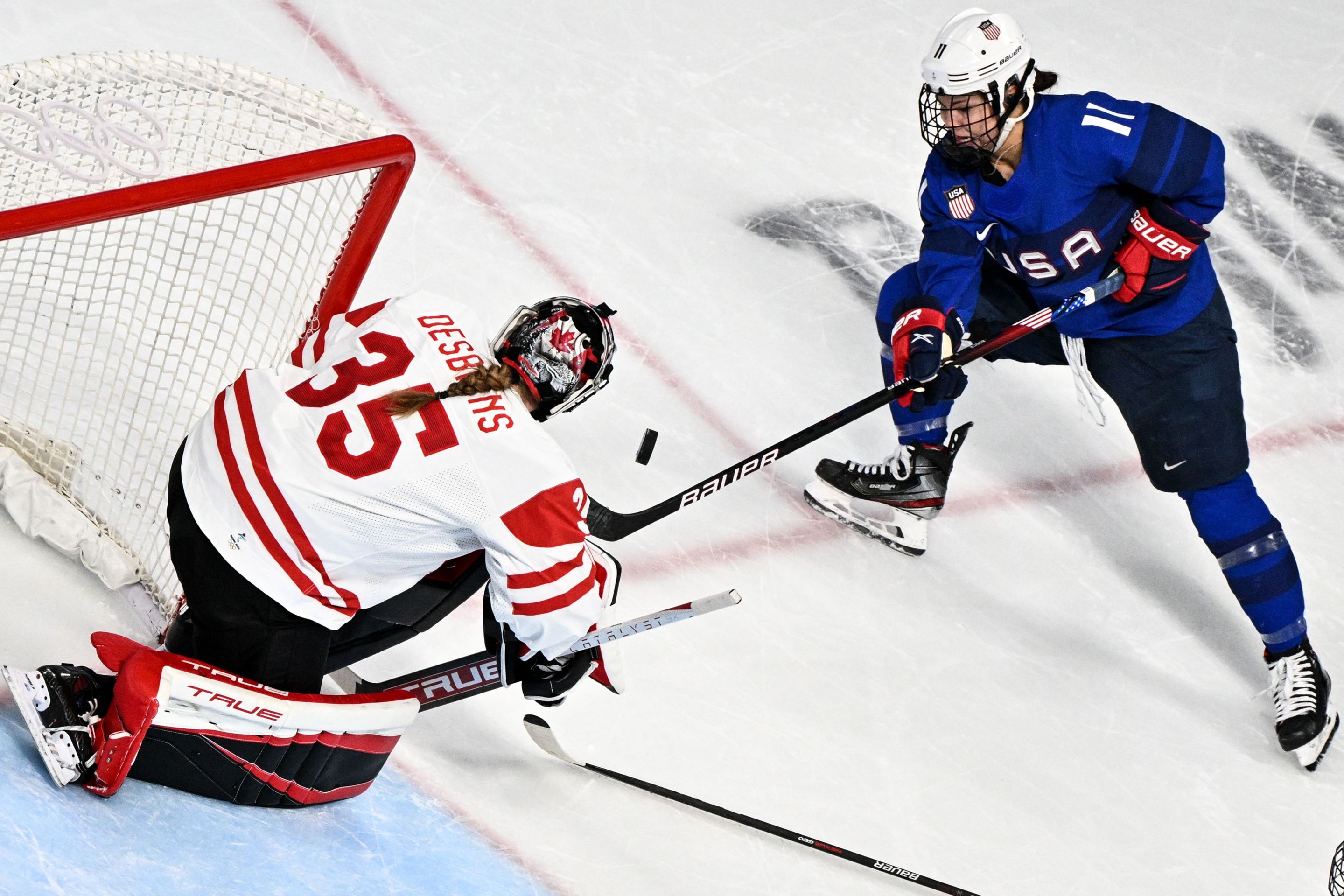Meet the two Teams USA. There's the one that plays at even strength and does so brilliantly, luxuriating in the offensive zone, cycling low to wear out defenders, retrieving pucks with ease, winning the small-area battles the "American development model" holds sacred. Then there's the Team USA that shows up on special teams, so shambolic it had me mulling a change in citizenship. The Americans' one-for-six power play and worst-ranked penalty kill should top the to-do list following a 4–2 loss to Canada in a preliminary round game in Beijing this morning, but the game showed how the Americans might beat the Canadians next time—when a gold medal is on the line—and that path to victory has a face in center Abby Roque.
If you asked the world's most orthodox hockey fan to describe their dream player, the result might be something like Roque, the 24-year-old former Wisconsin Badger making her Olympic debut, and the first Indigenous woman on Team USA. The grit/60 levels—off the charts. You wouldn't believe them. On a night when the U.S.'s veteran first-liners looked fairly invisible—this has now happened a worrying number of times in the last year, but anyway, not the point!—Roque, from the second line, stepped up to become her team's best forward. She played her typically physical game in all three zones, kept Canada's Fillier line pretty quiet, never sweat under the heat of Canada's aggressive forecheck, and drove play with her strength; if she is not especially big at 5-foot-7, she is practically impossible to move off the puck.
The Americans were down 1–0 after the first period, despite outshooting the Canadians 16–5, and Roque offered an old-school prescription in her intermission interview. "I think the rebounds are sitting there so we just have to really fight for those pucks. Sometimes they have three or four goalies in the net, it's like, players diving around," she said. "So I think we just have to bear down and get to those dirty areas." The Americans' first goal would come exactly that way in the second period, with Dani Cameranesi scoring on her own rebound chance after some sustained offensive zone pressure Roque helped start. Not long after, Roque pushed the puck up the ice on a power play rush that would give the Americans a (very brief!) lead when Alex Carpenter scored on her backhand. Canada then did some stuff we do not have time to discuss here, sorry.
TIED UP!
— NBC Olympics (@NBCOlympics) February 8, 2022
Dani Cameranesi with the equalizer for @TeamUSA! #WinterOlympics | #WatchWithUS
📺 : @USA_Network and @peacockTV
💻 : https://t.co/DaRR18atEa pic.twitter.com/trK6pf0AQl
The NBC broadcast took special note of Roque's success on the dot, where she won 11 of the 12 faceoffs she took against Canada. Dismiss this as a debunked old-man stat at your own peril! There's interesting research that points to some value in winning even neutral zone and defensive zone faceoffs in women's hockey, where faceoff wins might have a stronger relationship to puck possession. Roque has yet to find the back of the net through four games at the Olympics, but she's been about as valuable as a player can be without scoring herself, the consummate center. By managing the forechecking pressure with her great hands and balance, she can open up space for her teammates. Her line with Carpenter and Amanda Kessel on her wings combined for 16 of the U.S.'s 53 shots on goal.
In a different world, we may not be seeing so much of Roque. Though she'd played some eye-catching games in Professional Women's Hockey Players Association showcase events last spring, she averaged under nine minutes a game at the world championships in August, and she appeared in only one of the six preparatory rivalry series games in the fall due to a leg injury. Roque's opportunity to move up the lineup in Beijing was a consequence of a devastating loss to the team: Brianna Decker, alternate captain and passer extraordinaire, injured her leg in an ugly collision in Team USA's first game against Finland and was quickly ruled out for the rest of the Olympics. "I was really impressed with the adjustment that our lineup made and moving some people that, as of four hours ago, hadn’t played center or certainly hadn’t played center in the Olympics,” U.S. head coach Joel Johnson said after the Finland game. “Jesse Compher steps in and Abby Roque shuffles around and Kelly Pannek shuffles around and I didn’t think we missed a beat. That’s a credit to the depth that we have."
It is, absolutely. Missing Decker might explain some of the U.S.'s struggles to generate chances in the middle of the ice and on the power play against Canada, but this game wasn't all bad news. The Americans looked better for the majority of it and the depth lines really impressed when the stars were quiet. Except for the part where the power play is abysmal and the goalie was outplayed—fixable issues, just practice a lot and give Nicole Hensley a chance in net instead—they can keep doing what they're doing. Let the Canadians desperately cling to their cheap power play and penalty shot goals, the stuff of circus clowns! Tough, patient, Roque-style hockey can take the Americans far.






